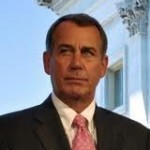
by | Apr 8, 2013
 Proving his concern about our country’s national debt wasn’t mere campaign lip service, Congressman Tom Latham continued to warn against the perils of a $17 trillion debt in Urbandale on Friday. He joined an event hosted by the Iowa chapter of Fix The Debt and toured the facility of Jon Troen’s ColorFX company.
Proving his concern about our country’s national debt wasn’t mere campaign lip service, Congressman Tom Latham continued to warn against the perils of a $17 trillion debt in Urbandale on Friday. He joined an event hosted by the Iowa chapter of Fix The Debt and toured the facility of Jon Troen’s ColorFX company.
Speaking to a group of ColorFX employees Latham seemed hopeful a long-term solution could be agreed to this year saying, “I think there is a real chance of getting a bi-partisan deal passed. It has to be done to ensure our nation’s economic and fiscal security.â€Â As the owner of a company trying to navigate through an increasingly shaky economy, ColorFX owner Jon Troen fully concurred by stating, “The national debt affects everyone and it has a direct impact on how small business owners like me run and manage their operations.â€
Mr. Latham’s participation in these types of forums should be heartening to all Iowans, regardless of their political persuasion, who realize continued record deficit spending is fatal to our entire population. I have reported here before that a close look at Rep. Latham’s voting record the last several years reveals a rock-solid fiscal conservative unwilling to mortgage the future for temporary political gains. With so many politicians these days willing to speak one way around election time and then consistently vote the other way when the spotlight fades, Iowa is lucky to have someone willing to both speak out and vote for their convictions.
Below are some pictures from the event:



by | Mar 11, 2013
 A very worthwhile group has come to Iowa recently and their mission is to solve the debt crisis that America is currently headed for. “Fix The Debt Iowa” is one of the 23 state chapters of a larger group which can be found at FixThe Debt.org.
A very worthwhile group has come to Iowa recently and their mission is to solve the debt crisis that America is currently headed for. “Fix The Debt Iowa” is one of the 23 state chapters of a larger group which can be found at FixThe Debt.org.
Last week they released a short web video in Iowa equating our nations fiscal problems with the budget of a middle-class family–which is cleverly done by adding or subtracting eight zeros.
I am happy to see efforts being made to frame the facts of this issue in a way that even the non-politically involved can understand. Since the national debt is now in excess of 16 million separate units of a million dollars, quantifying the problem is getting exceedingly difficult.
Below is the video, and if you are so inclined you can go to FixTheDebt.org to sign their petition.
![The Harsh Republican Reality of the Fiscal Cliff]()
by | Dec 10, 2012
 I break from a majority of Republicans on the current fiscal cliff negotiations and believe the rate increases that Democrats are seeking should eventually be agreed to. More specifically I would support John Boehner signing on to taking the top bracket from 35% to 37-38% (short of the 39.6% Obama wants).
I break from a majority of Republicans on the current fiscal cliff negotiations and believe the rate increases that Democrats are seeking should eventually be agreed to. More specifically I would support John Boehner signing on to taking the top bracket from 35% to 37-38% (short of the 39.6% Obama wants).
Of course the argument against doing so is the superior one—essentially that the Senate and the President want more money to spend while having not passed a budget in 3 years and having not yet put any real spending cuts or entitlement reforms on the table. But the two Parties have been at a stalemate over this issue for years and in my view the trump card is that last month they held the Senate, picked up seats in the House, and won the Presidency. To me the bottom line is that if a political party never agreed to anything they didn’t think was 100% ideologically or philosophically accurate we would never reach any compromise. This in fact is the definition of compromise, and in light of the election results anyone who thinks Republicans weren’t pushed into a position of forced compromise is fooling themselves.
The reasons for swallowing this bitter pill are multiple. First off, though often times the winner of an election pushes for the passing of legislation saying they ran on it when they really didn’t—that is not the case here. There is no question that President Obama ran on raising taxes on rich people and Mitt Romney ran on lowering rates and capping deductions. Secondly, over 60% of the American people in poll after poll say they want the wealthier among us to pay more taxes. Unfortunately, the alternative of refusing to budge on this issue in favor of tax increases on 98% of Americans is simply not good policy. All sides agree it would be devastating, not to mention it plays into all the awful stereotypes of Republicans and is politically fatal.
Not helpful here is that this whole discussion echoes the earlier scene at a Republican Primary debate where all 10 candidates on stage said they would not take a deal of $10 in spending cuts for $1 of revenue increases—the majority of non-hardliners in this country just flat out won’t deem a political party serious about solving a problem with this kind of position.
Just to be clear, the above is not at all to say I agree with raising any rates, but the facts are the facts. The Democrats have a far stronger hand here—and it’s certainly strong enough to yield this specific tax increase they desperately want.
Looking on the bright side, after suffering the defeat we just had nationally if the only direct price Republicans have to pay is to raise taxes by 2-3% on one bracket in order to get the Bush tax cuts made permanent (until we have a majority to do real reform), then I think one could argue that is not an obscenely high cost. The big part of making this an acceptable outcome is of course what will be given by the other side to reward this concession?
As of now clearly Democrats have not offered anything and are not acting in good faith. Since they don’t have to give on entitlement reform in this situation, essentially Democrats are going to have to agree to hundreds of billions in non-discretionary, non-defense spending cuts. My position is if Boehner gets this in exchange for the small bump in rates, that is an acceptable outcome. If he isn’t able to achieve that—then caving on this position is a major defeat.
The Media Fails Us Again
So far in this “negotiation” Republicans and John Boehner in particular have been getting killed for letting the whole debate revolve around a portion of revenue increase that would fund the government for about 8 days. This is such a great and obvious point, and frankly the shallowness of our national debates in general makes it hard to have much hope for the future of the Republic.
I fully agree with the criticism for Republican leadership losing the messaging war on one hand, but on the other I wonder what more they can do about it. Time and time again they speak of Washington not having a revenue problem but a spending problem, and they certainly are publicly making the case this would fund the government for only 8 days. The reality is that of all the power and influence the liberal media has over this country, perhaps the most lethal and subtle is their ability to decide what the focus of the debate is. For obvious reasons the President wants it to center on a rich vs. poor construct, and low and behold that is exactly what we have.
My Advice To Boehner
If I were advising Republicans I would suggest putting this debate in context by making an obvious point that I have not heard made yet. The absolute proof that we have a spending problem and not a revenue problem is that just to balance the budget in one fiscal year we would have to raise tax revenues by 40%. Yes that’s right, 40% more dollars into the treasury just to get to the point that we are not running a deficit every year—that is without paying down a penny of the $16 trillion in National Debt.
This of course is because in past years we have borrowed 40 cents of every dollar we spent (so far this year it is up to 46 cents of every dollar). The notion that tax rates would have to be raised on the entire country to a level generating 40% more money each fiscal year is so insane that just maybe it could break through the media machine and into view of the population.
The End Game
What’s so frustrating for Republicans, including myself, is how much sense these arguments make and that we can’t even get the Party that controls the majority of our government to even discuss the bigger more frightening picture.
That being said, the reason we have elections is so that each Party can make their case and the people can make their choice. Even though it’s not sound policy, given the fact that this choice has just been made, conceding a few percentage point increase for one tax bracket is not the end of the world.
In spite of all the venom being directed toward the Republican leadership in the House we need to be rooting for them to succeed—which in this case means getting the least destructive outcome in a tough situation.
The post The Harsh Republican Reality of the Fiscal Cliff appeared first on The Conservative Reader.

![The Harsh Republican Reality of the Fiscal Cliff]()
by Steven Waechter | Nov 14, 2012
 Well, Barack Obama will be President for a second term. It is now time to take a look around, and prepare for what is likely to happen next. Based on my observations and what I’ve learned over the years, these are my predictions:
Well, Barack Obama will be President for a second term. It is now time to take a look around, and prepare for what is likely to happen next. Based on my observations and what I’ve learned over the years, these are my predictions:
No Housing Recovery
Commentators have been calling the bottom of the housing market – and screaming with increasing urgency that it was time to buy – since 2007. The Fed has cut interest rates to nearly zero, and through quantitative easing has flooded the financial system with new money. This will continue for the near future, especially since QE-infinity was announced earlier this year. There remains no recovery in the housing market, and there won’t be a recovery.
Bad monetary policy has left the productive bits of the economy in an absolute shambles, and now there simply aren’t enough jobs to allow a recovery in the housing market. This will get worse, not better.
Mass Layoffs
This one will happen sooner rather than later. In an economy that is as sedate as ours the likelihood of reduced unemployment is already pretty slim, and if you consider the looming Obamacare mandates, tax hikes on income, dividends, and capital gains, as well as another four years of an administration that has a penchant for change (breeding uncertainty), I predict that there will be large job losses coming in the very near future.
Growing Poverty
This one seems to fall into place as well, especially for those laid low by the layoffs which I think are coming. But, even those who keep their jobs will experience marked decreases in their standard of living. In an economy where consumption is king and production – or any sort of value-added economic activity – is outsourced, taxed, regulated, or outright banned, the remaining employment opportunities take on a sort of wistful irrelevance. Many will be nominally employed, but at the same time wholly unable to support themselves, let alone able to assemble savings.
Spike in Utility Rates
All forms of energy are likely to get more expensive over the next four years. Obama has explicitly stated that he intends to bankrupt the coal-generated electricity industry in favor of renewable energy kitsch which can only be financially feasible with massive increases in electricity prices. Expect some coal plants to be shut down in the next term, and expect to pay far more for electricity.
High Prices for Oil and Grain
In a past article, I pointed out that since 1990, the United States has run trade deficits in excess of $9 trillion. This despite the fact that in 1990 the supply of dollars (the M2 metric) was only $3 trillion. In an economy where we can buy foreign goods by printing money, there is no reason to manufacture much of anything. This dynamic will continue for the time-being, and we will import shiploads of consumer goods and pay for it with nothing but inflation. This will lead to even higher prices for oil and grain, which are inflation-sensitive commodities whose production cannot be outsourced.
Feeding grain to livestock is a value-added activity, however, and in an inflationary economy the price of grain will go up, and the ability of the public to buy meat will be reduced, so I am predicting a continued decrease in the number of farmers who bother to raise livestock, as well as a decline in the overall size of the livestock herds in the country.
College Tuition Spikes; Enrollment Begins to Fall
Obama’s attempts to reform the student loan industry had nothing to do with controlling the costs of college. The government runs most of the student loan industry, and interest rates have been kept very low for Federal loans. This is all designed to get more kids into college, regardless of what it costs, and with no real limit to the amount of credit available to the college-bound, there are no incentives for colleges to control costs.
The luster has begun to rub off of the whole college experience in my estimation. A college degree has become little more than a very expensive lottery ticket, and new college graduates will not see any discernable increase in their employment opportunities, incomes, or future prospects.
Even with the endless propaganda urging kids to attend college, the decision to attend college will not make financial sense for a large number of American kids, and we will begin to see a decline in enrollments, especially in full-time, traditional enrollments.
((To Continue Reading, Click Here To Go Straight To Part 2))
The post Predictions for the Next Four Years (Part 1 of 2) appeared first on The Conservative Reader.

by John Bloom | Jun 29, 2011
 The Des Moines Register’s Editorial on Monday, June 27, 2011 was titled “Steep budget cuts now could harm economyâ€.
The Des Moines Register’s Editorial on Monday, June 27, 2011 was titled “Steep budget cuts now could harm economyâ€.
Summary – The Register’s Editorial group pointed us once again to the “nonpartisan fiscal agencyâ€, the Congressional Budget Office (CBO).  They quoted the CBO’s “dire warning about unsustainable federal deficitsâ€, but cautioned that the report also “warned that steep cuts right now could make the nation’s fiscal condition even worse by kicking the legs out from under the economyâ€.  Also on June 27th, The Wall Street Journal’s front page led off with an article titled “Debt Hamstrings Recoveryâ€[1].  The WSJ’s Tom Lauricella notes “Around the globe, the inability of governments and households to reduce their debt continues to cast a shadow over Western economiesâ€â€¦â€Unlike the aftermath of typical recessions, simply lowering interest rates hasn’t been enough to get growth back on track…Quite the opposite has been the case… The lowered cost of borrowing has enabled individuals and government to delay taking measures to change the way they spend and save.â€
Comment on the DSM Register’s Selective Reporting – I have noticed a pattern of inconsistency in the DSM Register’s and WSJ’s reporting.  Many featured articles in the WSJ, arguably a far more competent source of economic analysis than Gannett’s network, are minimized or never presented in the DSM Register. In addition to the “Debt Hamstring†analysis, another recent example would be the study released by management consultant McKinsey. They surveyed 1,300 companies and found that one third (1/3) of them will “definitely†or “probably†stop offering health insurance after 2014.  Since candidate Obama guaranteed us that we would be able to keep our current insurance, this seems like a worthwhile piece of news. If the DSM Register featured it, I must have overlooked it. I wonder if the nonpartisan CBO is aware of it?
Analysis of the “Spend Now, Save Later Strategyâ€Â - If we were in the position of China, over $3 trillion in foreign exchange reserves[2], I would not have a big issue with spending some of those reserves to shore up a short term slump in the economy.  However Government debt as a % of GDP has increased from 30% in the early 2000’s to 35% by the end of the Bush presidency (increasing under both Republican and Democrat congresses). During the Pelosi-Reid-Obama era, that % is now approaching 60%.  Meanwhile consumer debt and mortgage debt has more than doubled since 2000 (from $10 to about $20 trillion combined). Given the state of our debt, any increase in interest rates (almost a certainty the way the Fed has increased the money supply) will quickly multiply the consequences of our excessive debt.   For my entire adult life I have heard politicians claim that we will “save later, when the economy is strongerâ€. That day never comes. The Clinton-Gingrich era budgets were a nice anomaly but were not based on sustainable structural changes. The Register is wrong. We must cut government spending substantially and quickly.
[1] WSJ 27 June 2011, Debt Hamstrings Recovery
[2] WSJ, 26 June 2011, “China Pledges Continued Support for European Debtâ€




 Proving his concern about our country’s national debt wasn’t mere campaign lip service, Congressman Tom Latham continued to warn against the perils of a $17 trillion debt in Urbandale on Friday. He joined an event hosted by the Iowa chapter of Fix The Debt and toured the facility of Jon Troen’s ColorFX company.
Proving his concern about our country’s national debt wasn’t mere campaign lip service, Congressman Tom Latham continued to warn against the perils of a $17 trillion debt in Urbandale on Friday. He joined an event hosted by the Iowa chapter of Fix The Debt and toured the facility of Jon Troen’s ColorFX company.




